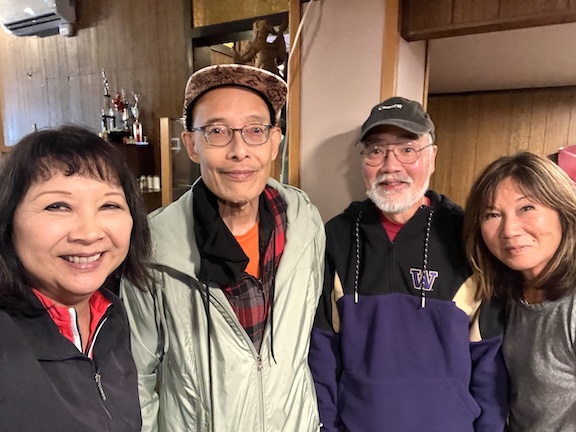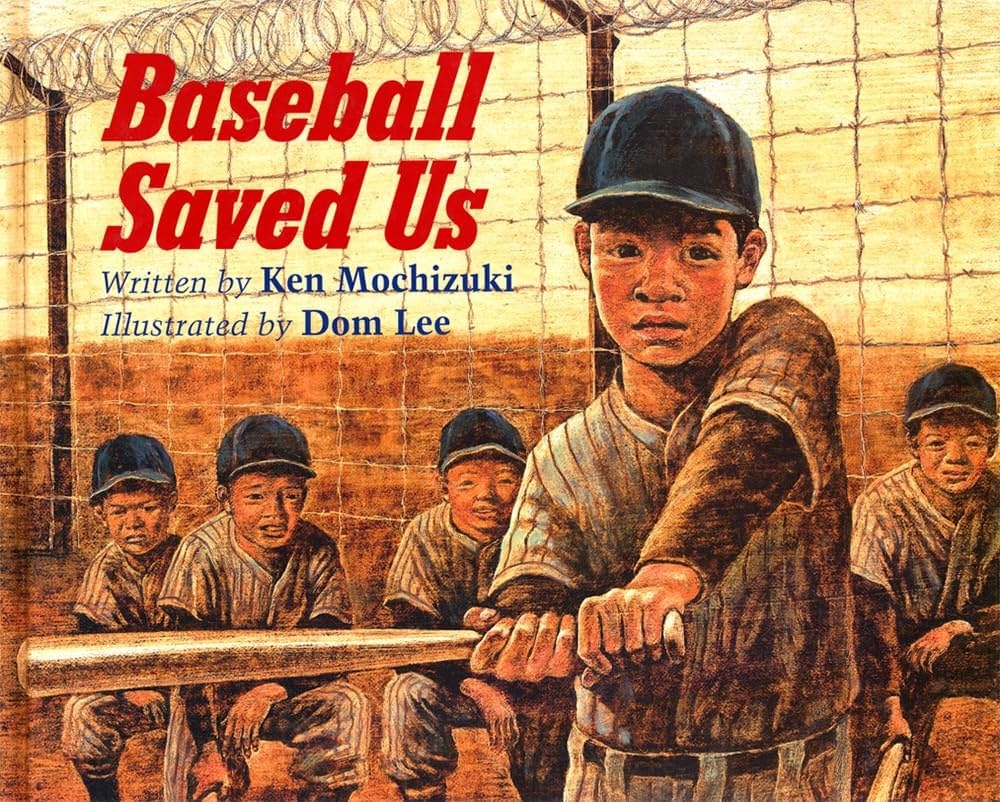By P.C. Staff
Less than two months after the Asian American Journalists Assn. honored him with its Lifetime Achievement Award on Aug. 2 in his hometown of Seattle (see Pacific Citizen, Sept. 5, 2025, tinyurl.com/32fdbczd), Ken Mochizuki succumbed Sept. 20 to the esophageal cancer that kept him from accepting the recognition in person. He was 71.
An actor, screenwriter, author and journalist, Ken Steven Mochizuki was born in Seattle and raised in its Beacon Hill neighborhood, the middle son of Miyeko and Eugene Mochizuki. At the time of his death, he had been living in Maple Valley, Wash.
After graduating from the University of Washington’s School of Communication, where Mochizuki had been bitten by the acting bug, he pursued the craft in local theater before decamping to Los Angeles in 1976 for five years, with much of that period spent at East West Players.

From Oct. 10, 2024 (from left) are Lori Matsukawa, Ron Chew,
Ken Mochizuki and Mimi Gan. (Photo: Courtesy of Lori Matsukawa)
Although he had landed a role in a 1979 episode of “M*A*S*H,” he found that Hollywood did not have an abundance of roles, positive or otherwise, for Asians, especially Asian men.
Dom Magwili, one of Mochizuki’s thespian friends from his time in Los Angeles, nevertheless recalled that he thought Mochizuki’s career was on the upswing after the “M*A*S*H” appearance. “But the next thing you know, you find out, well, he’s leaving for Seattle this weekend,” Magwili recalled. Mochizuki had something else in mind for his future: writing.
When Mochizuki visited to say goodbye to Magwili and his wife, Saachiko, before putting L.A. in his rearview mirror, the couple had a parting gift for him. “I had a green Royal portable typewriter, and we gave it to him. I wasn’t using it. And he’s going to be a writer. ‘Well, get about it.’ And then he does. He actually gets something printed,” recalled Magwili. “He is the first of people that I know who got something published. Very proud of him.”
In 1981, Mochizuki did, however, spend 13 weeks working in Boston on a WGBH-produced TV series titled “The New Voice,” about young people who start a newspaper, which would, in a case of life imitating art, presage his future journalism career, in which he focused on covering Asian American and Japanese American stories.
Ron Chew, Mochizuki’s friend and journalism mentor at Seattle’s International Examiner, told the Pacific Citizen how they met and how Ken started on the path of becoming a writer.
“He had come back from L.A. where he tried to pursue an acting career and found that the doors were pretty much not open to Asian American, particularly male actors,” said Chew. “He was glad to leave that with life behind.”
“I served as his editor, and he was very interesting because he would listen to everything I said,” Chew told the Pacific Citizen. “I had this practice of going over stories with all my writers while they were there, literally doing the editing in front of them so they knew what I was doing. So, he was my most attentive and patient journalism student, and over time, he just became a terrific writer and reporter. So, our friendship blossomed.”
Mochizuki also contributed a short story that appeared in the 1987 Holiday Issue of the Pacific Citizen (see tinyurl.com/5n7arfer.).
Back home, Mochizuki would combine his old love of acting and movies with his newfound love of writing when he turned the novel he was working on into the screenplay for 1985’s independently produced movie “Beacon Hill Boys,” in which he had the lead role in its ensemble cast (see Pacific Citizen, Aug. 16, 1985, tinyurl.com/39actwfz). In 2002, “Beacon Hill Boys” was published by Scholastic Press as a young adult novel.

Ken Mochizuki’s award-winning “Baseball Saved Us”
But it was the children’s book genre where Mochizuki arguably made his biggest mark. Teamed with illustrator Dom Lee, Mochizuki authored 1995’s “Heroes” (about a Japanese American boy who gains pride in his heritage from the military service of his 442nd/World War II veteran father and Korean War veteran uncle); 1997’s “Passage to Freedom: The Sugihara Story” (about Japanese diplomat Chiune Sugihara); and 2006’s “Be Water, My Friend: The Early Years of Bruce Lee.”
But it was Mochizuki’s award-winning debut in the genre — 1993’s “Baseball Saved Us” — that no doubt serves as the milestone — and personal and professional turning point — for him. He is set to posthumously receive a Community Voice Award from the International Examiner at its Oct. 23 gala banquet.
“He had a fighting spirit, and he really tried to fight it until he passed,” Chew said of his friend’s losing battle with esophageal cancer.
Mochizuki was predeceased by his wife, Merry, and his parents. He is survived by his brothers, James (Susan) and Alan (Stacey); three nephews and a niece. Plans for a celebration of life are pending. According to his wishes, those wishing to honor his memory may make donations in his name to the Wing Luke Museum (wingluke.org), the International Examiner (iexaminer.org) or the Asian American Journalists Assn. (aaja.org).
Mochizuki’s website is kenmochizuki.com.



